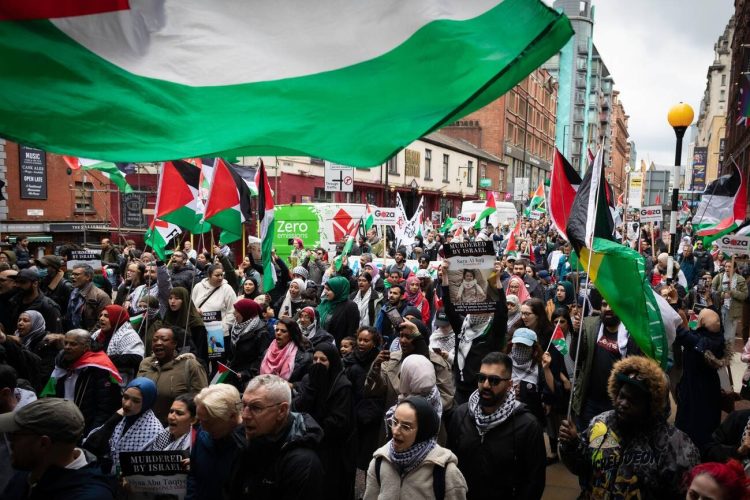Gaza War widens the Western divide. Western support for Israel threatens the liberal world order that the West has consistently promoted for decades. Alongside America, Israel’s allies emphasize Israel’s right to defend itself. However, international law asserts that genocide has no justification. While Western countries profess to support the Palestinians and the residents of the Gaza Strip, they have recently employed various measures to obscure the truth about Israel’s actions. This article explores the shifting public opinion towards the Gaza War and the resulting differences in perspectives.
The participation of Western countries in Israel’s war against Gaza
The destruction of the West in the Gaza war has vast dimensions, from obstructing the delivery of humanitarian aid to disrupting the ceasefire. Various measures have been implemented to promote Israel’s desired narrative of the recent war. This reflects the current state of Western rhetoric and actions concerning Israel and Palestine. The disparity between words and actions is not a new issue.
Blocking the path to a ceasefire in Gaza
Every meeting in international institutions, from the Security Council to the United Nations, was accompanied by the disruption of America and its allies. In several meetings of the Security Council, America prevented and vetoed the resolutions about this war. Washington claims that any action on the ceasefire can lead to the strengthening of Hamas. These vetoes take place while the focus of recent resolutions is on providing humanitarian aid to the Gaza Strip.
The disregard of the liberal-democratic regimes for Israel’s genocide in Gaza
The West and its media have been trying to hide the facts since the beginning of the Gaza war. Even when the International Court of Justice issued a temporary order to stop Israel’s genocide, countries like America and Germany strongly criticized this temporary order; America claimed that there was no genocide in the Gaza Strip.
The media’s false narrative of the events in Gaza
Since the beginning of the Gaza war, various accounts of the events in Gaza have been published by Israel. The West and the Western media have published and repeated these narratives instead of the truth. The tragedy of killing in al-Nabulsi Roundabout in Gaza City resulted in more than 100 martyrs and 760 injured. Israel had claimed that aid trucks had run over the crowd and that the crowd had died. This is just one example of the false narratives that Israel has put forward about the facts of the Gaza war. Israel’s Western allies repeat the same fake narrative of reality.
The contradictory approach of Western countries to the recent events in Gaza
Comparing the positions of the West towards the Gaza war reveals the very contradictory approach of the West towards various events in the world. During the Ukraine war, Western countries requested an emergency meeting of the Security Council from the very beginning. They tried to form a fact-finding committee and sought the approval of the resolution in institutions such as the Security Council. But now the Gaza war has happened. About nine months have passed since the beginning of this war. The statistics of casualties and destruction of this war cannot be compared to the war in Ukraine.
The positions of the applicant against the war in Gaza and the war in Ukraine
The West considers itself the supporter of the people of Gaza, apparently expresses concern and issues a statement. In practice, Western countries conclude more arms agreements with Israel. Donations should be increased. Western officials have travelled to Israel many times to meet Netanyahu’s cabinet. The statistics related to the Gaza war are considered world records in many cases. However, the West’s stance on this war differs significantly from its position on Ukraine. Western countries have not requested an emergency meeting. They have not attempted to create a fact-finding committee and even the meetings that have occurred face obstacles.
The European Union’s discriminatory approach to the Gaza war
The approach of EU members towards the war between Hamas and Israel is not uniform, and there are severe differences of opinion in this regard. At a recent EU summit, member states debated for hours whether the EU should call for a ceasefire to send vital humanitarian aid to Gaza. In the end, European countries agreed on ”humanitarian pauses“. In the discussions held at the meeting of European leaders, some of these leaders were clearly against the declaration of a ceasefire. Some European countries have also increased the amount of military aid sent to Israel.
Gaza War widens the Western divide
In recent weeks, demonstrations have occurred in Paris, London and many European cities. These protests have been formed against the wishes of the governments. European public opinion is divided and complicated in the face of the Gaza war. Various factors shape the views and reactions of Europeans in the face of this war. These factors include their historical relations with Israel or Palestine, religious and ethnic background, and political affiliations.
The solidarity of global public opinion with the issue of Palestine
Some of the demonstrations that were held in Paris, London and other European cities in the past weeks were to express solidarity with the Palestinians who have been affected by the Israeli attacks and the blockade of Gaza. Many protesters condemned Israel’s human rights violations and disproportionate use of force. They demanded an end to settlement expansion. Some also asked their governments to take a stronger stance against Israel or impose sanctions. Gaza war widens the Western divide, and Europeans are critical of their leaders’ positions.
Change of approach of European leaders following criticisms
Some European leaders may feel compelled to adopt a balanced or critical approach toward Israel. In this sense, the Gaza War widens the Western divide. They must increase their humanitarian and diplomatic efforts to end the war and support the peace process. Others may stick to their existing policies and try to curb social unrest. In any case, what is seriously observed is that European leaders must face the challenge of reconciling their interests and values with the realities and expectations of their diverse and scattered populations.
The rise of humanitarian sentiments in Europe after the Gaza war
Gaza war widens the Western divide and raises emotions and tensions in Europe. This war revealed the deep divisions and prejudices that existed within and between European societies. The war has also highlighted the gap between the official positions of European governments and the public opinion of their citizens. Most European leaders have expressed their support for Israel’s right to self-defence. They claim to respect international laws by the parties to the conflicts and support civilians. Many Europeans have questioned this position and accused their governments of siding with or collaborating with Israel.





























